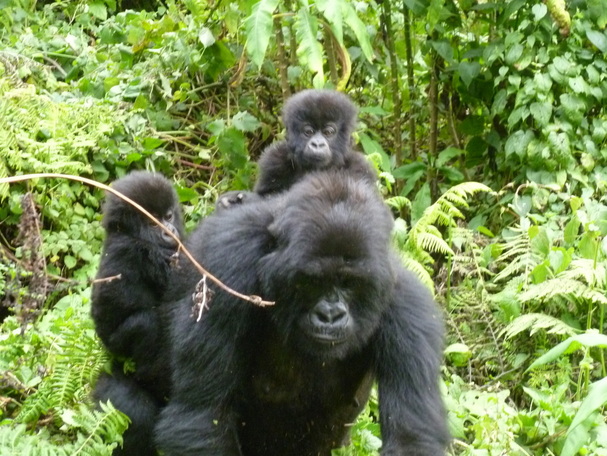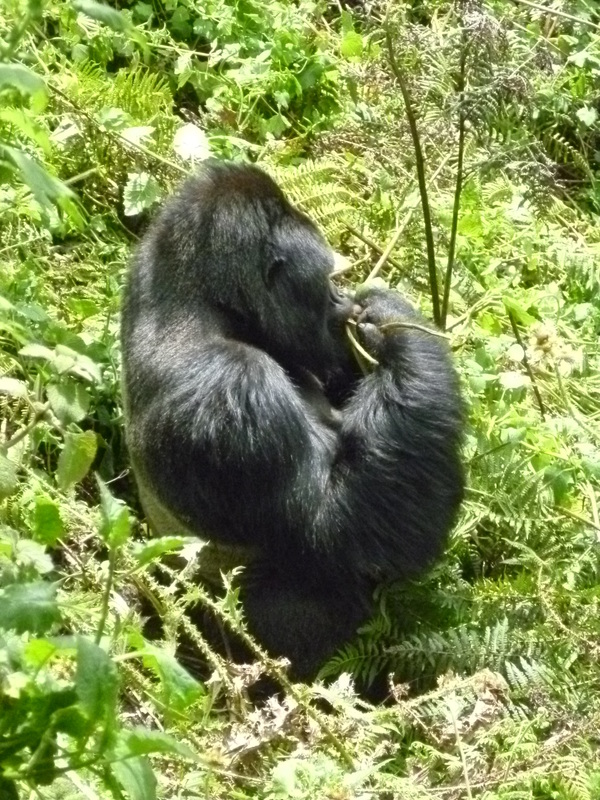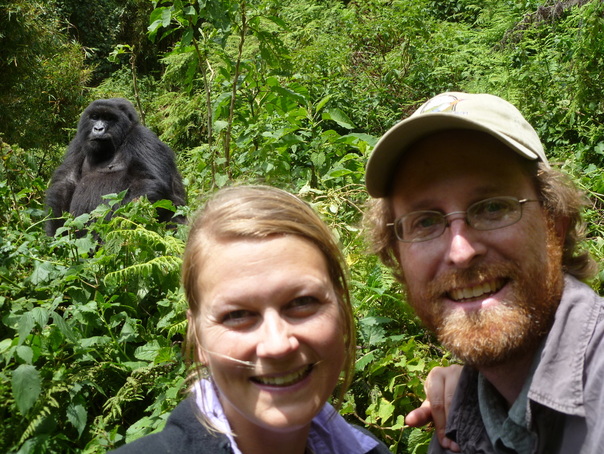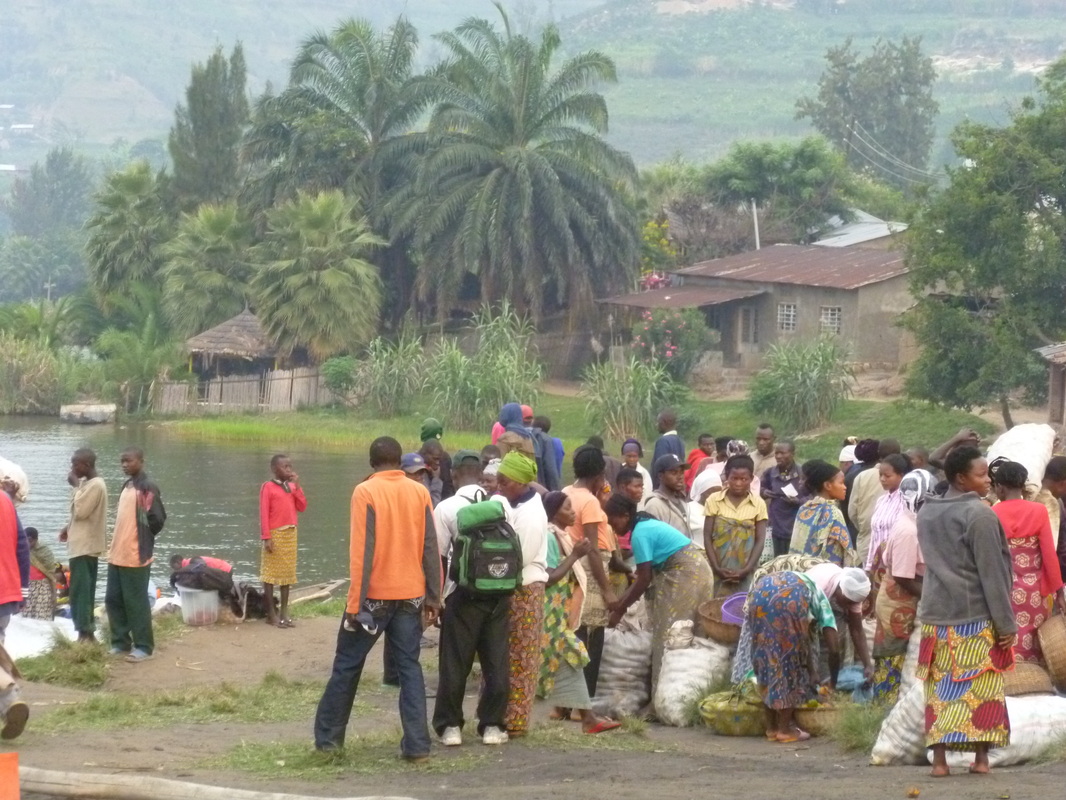|
The silverback gorilla I encountered was a lady’s man. His family—one of seven habituated gorilla groups in Rwanda’s Parc National des Volcans—is called Hirwa, a Kinyarwanda word that means “lucky.” The group is named after the success of the dominant male, Munyinya, who has battled silverbacks in three other groups and succeeded in convincing a female from each one to join him in his own territory. Now they are 16: the silverback, five females, five juveniles, and five babies, including a set of twins named Isangano ("meeting place") and Isango ("appointment").
To reach the group, we had to hike partway up the Sabinyo Volcano, which had the steepest slope I’ve climbed since Half Dome in Yosemite National Park. We—our trekking group of eight, plus a guide, a porter, and an armed guide—pulled ourselves up using vertical stalks of bamboo and jungle vines. It took about two hot hours before we finally reached the group of trackers who had already located the gorillas. I was at the front by the guide, so I was the first to see a large, black, crinkled face. It quickly disappeared. The gorillas were in a ravine filled with their favored food, a celery-like stalk called Peucedanum linderi (which was very bitter but refreshingly watery when I tried it myself), and thorny trees, stinging nettles, and tangled briar. We had to climb on top of it all, since it was impossible to walk through, which had us sliding over green mattresses of jungle. When we landed on solid ground again, we were surrounded by gorillas. The silverback, Munyinya, was as enormous as an NFL linebacker times two. He kept his back turned toward us and made low rumbling sounds, which our guide, Oliver, returned. Oliver said the rumble means, “Everything’s OK.” I was filled with a sort of whipped wonder, which made my chest feel airy, buoyant. Just five feet to my left was a large mother with her two tiny twins clinging to her back, looking at us with wide eyes. Then another female ambled down a slope directly toward me. I stepped back, but she just kept coming, paying no attention to me. She brushed past my pant leg and headed down the hill. Further off, youngsters swung on one arm from tree branches. One fell down and somersaulted through the bush in a black hairy ball. We continued to slip, slide, and crunch our way down the ravine, following the silverback. I’d look in one direction, see a tall bush shaking, and then see the wrinkled face or round back of another gorilla. At times, one would look directly at us, so peacefully and non-challantly, not really caring that we were there. The hour we were there, the gorillas never seemed to stop eating. When Munyinya turned to the side, I could see him feeding four or five stalks into his mouth at once, like a combine. There was a juicy crunching sound and more low, satisfied grunts. Everything’s OK, he said.
3 Comments
The day after the soccer match, we traveled to a beautiful lodge called Paradise Malahide right on Lake Kivu. While we were waiting for our room to be ready, we heard singing. We walked toward the adjacent village to find the source. The music was coming from inside a church with mudbrick walls and an aluminum sheet roof.
Near the road, a man wearing a silky butter yellow shirt and pressed slacks greeted us and said, “Welcome.” Although the service had started a while ago, he said we could go in. He led us up a dirt slope to the entrance. Inside, Rwandans sat on wooden benches on all four sides of the building. There must have been at least 200 people in there, dressed in beautiful bright prints and nice slacks or skirts, the women in headwraps. The choir was singing on their feet, smiling and sometimes raising their hands expressively. The language was foreign, perhaps Kinyarwanda, and the voices were high and melodic, accompanied by two men on men guitar. When the music ended, a pastor came up holding a Bible. He said a few words and then one by one, people walked up to the front table, clutching wadded bills. A man came and sat in front of us. He introduced himself and explained in English that the church was collecting money to finish the roof. I looked up and saw that the roof was indeed covering about four-fifths of the church. I could see the sky. Mike got 5,000 francs (about $8.00) from his wallet, and I walked the money up to the front. When I got there, I saw that the other bills from church members were 1,000s (about $1.60). The pastor said, “Merci! Merci! Merci! Thank you! Thank you!” All the church chuckled at his use of French and English instead of the local language. Our translator said it was time to pray, and we all held hands. A little boy, about 1 ½ years old, toddled up to me and touched my lap. He looked in my eyes. Such soft cheeks! I picked him up for a moment and turned around to see his mother holding her face and laughing. After the service, we learned that our translator’s name was John, a simplified version of a much longer Rwandan name. He held Mike’s hand as we walked and talked. (Being physically close and holding hands is normal here between men. It is simply friendly and warm.) As Mike and I walked back to the hotel, we felt so lucky to have chanced on such an intimate community gathering. That morning I wrote in my journal, “Rwanda has cracked me open. It’s created a rift in my heart, and poking through is the mushy raw emotion that traveling, if you’re lucky, exposes—a jungle-filled valley filled with the monkeys, vines, butterflies, and tall trees of joy, sadness, hope, wisdom.” A few days later we visited the Genocide Memorial Centre in Kigali, which reveals the history of tribal favoritism during Belgium’s colonial rule that helped lead to the genocide. Then the memorial’s exhibits describe in stomach-churning detail how men, women, and children were mutilated, raped, and murdered in 1994. When I left the memorial with tears in my eyes, I questioned how a nation could rebuild itself after such an event. I thought back to the soccer game and the church service and the genuine smiles that I saw on the faces in both of these places. I cannot begin to comprehend how Rwandans feel about the country’s deadly history--and this was not a topic that I wanted to bring up with the local people I met. What is clear is that, at least in some places, Rwandans continue to fully celebrate and appreciate life in a way that made me want to do so, too. In Rwanda, we spent two days on Lake Kivu, near the town of Gisenyi and Congo border. Here, some of the major tragedies of the country's 1994 genocide occurred. It’s estimated that more than 800,000 people were murdered in Rwanda within a hundred days, and thousands more were tortured, raped, and mutilated.
Before I visited Rwanda, this horrific event was about all I had heard about the country, besides the fact that some of the world’s last wild mountain gorillas live here. But the time I spent on Lake Kivu gave me a new, vibrant picture of Rwanda and its people. As we rode to Gisenyi in a local bus, we saw minibuses passing us filled with young men shouting and cheering, blowing vuvuzelas (long, loud, noise-making horns), singing, and wearing blue and white T-shirts. Some men had powdered their bodies, and they wore white clown wigs. A fellow passenger informed us that the wild men were fans of Rayon Sports, the most popular soccer team in Rwanda’s capital of Kigali. They were heading to Gisenyi for an important match with the Etincelles, another national league team. We decided that we had to go, too. Inside the stadium, nearly every space was filled, from the standing-room-only section across from us ($1.80 per ticket) to the cement benches we sat on ($3.30 per ticket). In front of me were two men in wheelchairs. One of them was missing his legs, a possible sign that he had been a victim of the genocide. I also noticed a couple young men who had severe burn scars on their faces and necks. They would have been children in 1994. The crowd was at first relatively quiet, with a few collective sighs for missed goals. But then Rayon Sports scored, and their fans stood up, threw their hands in the air and hollered. We were in a section mainly filled with fans of the Etincelles, the underdogs. When they scored, the people around us burst into cheer, gave us big high fives, and jumped up and down. A young woman in front of us did a hip-shaking dance. Little boys ran into the grass below us, imitating the goal-winning kick. Eighteen years ago, many of the people in stadium would have been personally affected by the genocide in some way. Today, they are able to enjoy a soccer game together in peace. The match ended in a tie, and the stadium poured out to local bars to have Primus beers and beef skewers. The next day, I witnessed another kind of celebration. This time, in a church. (Continued in my next post.) |
Archives
July 2012
Categories
All
|




 RSS Feed
RSS Feed